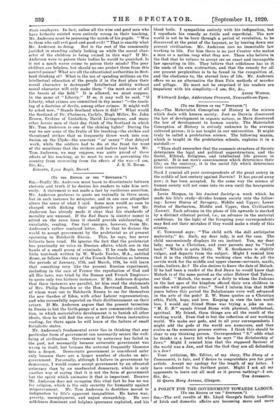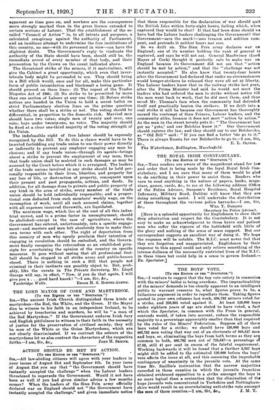A POLICY FOR THE GOVERNMENT TOWARDS LABOUR.
(To THE EDITOR OF THE " SPECTATOR."'
Sia,—The evil results of Mr. Lloyd George's feeble handling of Irish and domestic affairs are becoming more and more
apparent as time goes on, and nowhere are the consequences more strongly marked than in the gross licence extended to certain sections of Labour. That the establishment of the so- called "Council of Action " is, to all intents and purposes, a calculated conspiracy against the authority of Parliament, and an insidious attempt to undermine the free institutions of this country, no one—with its personnel in view—can have the slightest doubt. The Government's reply to vindicate the authority of the State should have been, should still be, the immediate arrest of every member of that body, and their prosecution by the Crown on the count indicated above.
The threatened strike of the miners, if it materializes, will give the Cabinet a great opportunity, which even that inver- tebrate body might be persuaded to use. They should bring in a Bill which would, once and for all, make this particular form of public intimidation and blackmail a losing game. It should proceed on these linos: (1) The repeal of the Trades Disputes Act of 1906; (2) No strike to be permitted by more than one section of Labour at any one time; (3) Before strike notices are handed in the Union to hold a secret ballot on strict Parliamentary election lines on the prime question whether there shall be a strike or not. The voting should be differential, in proportion to the domestic risk. Married men should have two votes; single men of twenty and over, one vote; boys under twenty-one, no votes. The majority should be fixed at a clear one-third majority of the voting strength of the Union.
The indefeasible right of free labour should be expressly recognized by the Bill. To do this a clause would have to be inserted forbidding any trade union to use their power directly or indirectly to prevent any employer engaging any man ho chooses; and if any trade union—through its agents—brings about a strike to prevent the employment of any man, then that trade union shall be mulcted in such damages as may be assessed by the Court before which it is arraigned. The leaders of the trade unions involved in any strike should be held per- sonally responsible in their lives, liberties, and property for any loss of life, or destruction of property, consequent upon their present and past propaganda, actions, and deeds. In addition, for all damage done to private and public property of any kind in the area of strike, every member of the trade union should be held individually responsible; and a propor- tional sum deducted from such members' weekly wage, on the resumption of work, until all such assessed claims, together with all expenses incurred therewith, are liquidated.
The minimum wage, which lies at the root of all this indus- trial unrest, and is a prime factor in unemployment, should be abolished—except in the case of agriculture, where the Government has entered, unfortunately, into a specific engage- ment—and masters and men left absolutely free to make their own terms with each other. The right of deportation from this country of men who openly proclaim their intention of engaging in revolution should be embodied, and the Govern- ment finally recognize the referendum as an established prin- ciple for ascertaining the opinion of the country on specific measures. It goes without saying that all professional foot- ball should be stopped in all strike areas and public-houses closed. There is nothing in such a Bill that people not criminal in their instincts can possibly object to. But, prob- ably, like the curate in The Private Secretary, Mr. Lloyd George will say, in effect, " Now, if you do that again, I will give you a . good hard knock! "—I am, Sir, &c.,



































 Previous page
Previous page